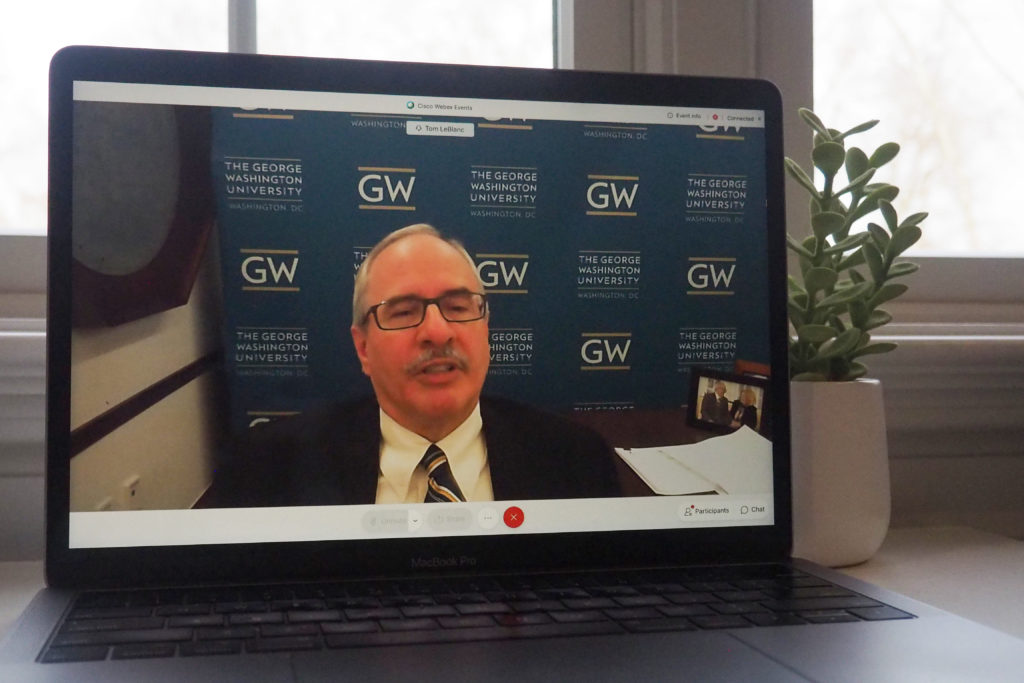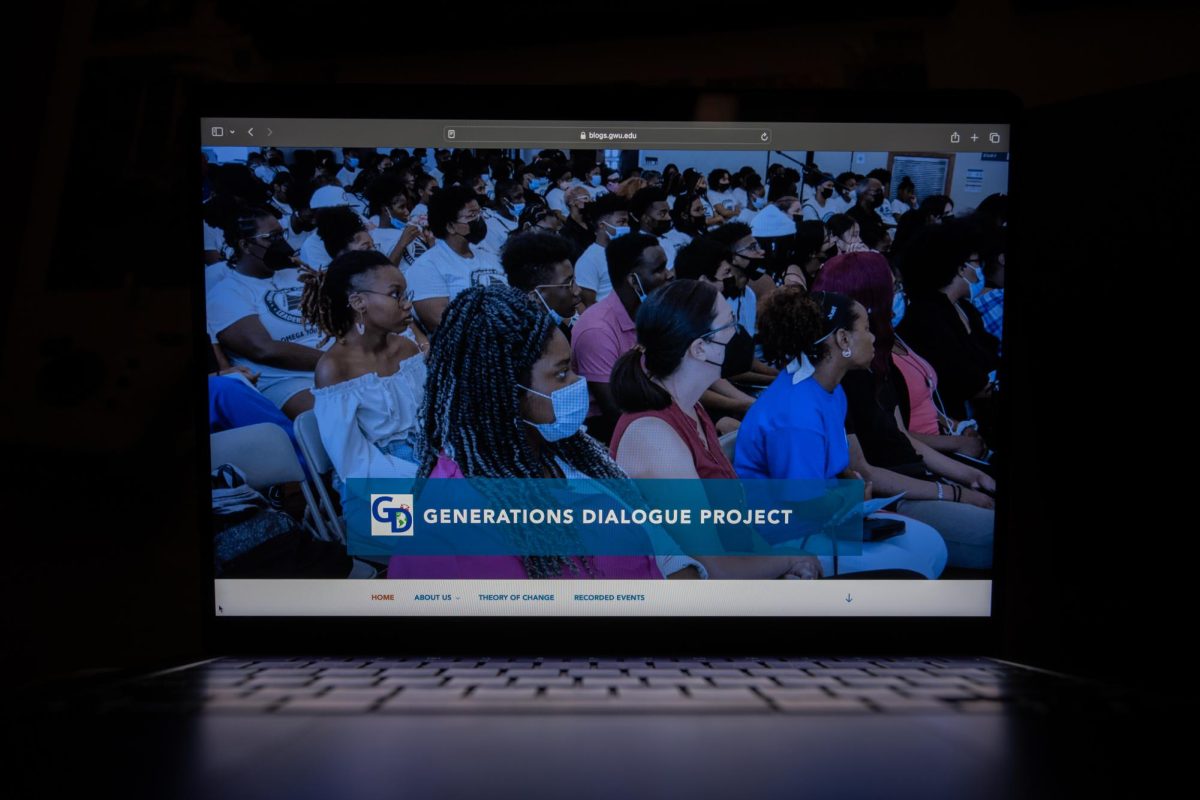The Faculty Senate passed a resolution voicing “serious concerns” about University leaders’ ability to advance GW’s mission at a special meeting Friday, responding to a recent faculty survey that indicated overwhelmingly negative sentiments toward administrators.
The senate’s executive committee developed the resolution following an analysis of the results of the survey, which was created last year amid rising tensions and found only about a quarter of professors have confidence in University President Thomas LeBlanc’s leadership. LeBlanc, who was only present at the beginning of the meeting, said the results had already been shared with the firm helping conduct the Board of Trustees’ standard review of his performance, which precedes the Board’s decision about renewing LeBlanc’s contract.
“I’ve been disappointed and I regretted that at times we’ve not always achieved the goal of constructive collaboration, an area of critical importance as we seek to strengthen our shared governance,” LeBlanc said. “To those of you who participated in the faculty survey, I want to say that I’ve read your feedback and I’ve taken it to heart.”
The resolution directs the chair of the senate’s executive committee to share the survey results at the next Faculty Assembly meeting in October.
An earlier version of the resolution called for LeBlanc to develop a plan to support transparency and shared governance to rebuild trust with GW community members. But faculty senators voted to remove the clauses before the final vote, arguing that faculty weren’t responsible for instructing specific actions for LeBlanc and trustees to resolve divisions.
Faculty have said they’re unsure LeBlanc can salvage relationships with GW community members following a year marked by rising tensions between the two.
“The Faculty Senate expresses serious concerns about the leadership’s ability to uphold and advance GW’s vision and mission, the success of which require broad support from faculty, students and staff,” the resolution states.
The Faculty Assembly approved plans late last year for the senate to administer the survey and subsequently share its results with the assembly.
The resolution is one of many that the senate has approved in the past year to address concerns expressed in the survey, including shared governance, research and diversity, equity and inclusion. Senators passed a resolution in October expressing “severe disapproval” for LeBlanc following the hire of Heather Swain, a Michigan State University official who GW community members criticized for her role in the Larry Nassar sexual abuse case.
The resolution and faculty survey results come as the Board works to conduct its standard review of LeBlanc in advance of deciding whether to extend his contract. LeBlanc said at the meeting that the survey results have been shared with Terrence MacTaggart, a senior consultant and fellow at the Association of Governing Boards of Universities and Colleges who is assisting the Board in its review as an outside facilitator.
Sarah Wagner, the senator who proposed the amended resolution and an associate professor of anthropology, said the senate had previously passed resolutions that raised objections to the top five concerns identified in the survey — GW’s leadership, consultation, decision-making, University vision and competence.
But she said LeBlanc has indicated he believes the primary concerns expressed in the survey deal more with shared governance and has not addressed faculty members’ broader concerns. As a result, she said she was hesitant to include a clause in the resolution continuing to ask LeBlanc to rebuild trust with GW community members.
“I think there has been a very clear attempt to work with the president, and I am loath to add in yet another resolving clause that seems to be somewhat empty language right now given the past,” she said.
Arthur Wilson, the chair of the executive committee who proposed the original resolution, said executive committee members faced a sense of “urgency” to develop recommendations between the release of the survey results earlier this spring and the start of the new senate’s term in early May. Wilson endorsed Wagner’s amendment, saying executive committee members recognized how “contentious” the clauses were among senators.
“I think it has been clear for some time now that some of the parts of the resolution might not have much agreement,” he said.
Wilson said senators planned to include the survey results – which only full-time faculty members can currently access – in the resolution, but ultimately decided against it in the interest of passing the resolution before new senators begin their terms.
Two senators also tried pausing further debate about the resolution, citing concerns that some full-time faculty members were not given an opportunity to respond to the survey and that the senate was moving too quickly in developing recommendations from the results.
Sylvia Marotta-Walters, a faculty senator and a professor of counseling, moved to recommit the resolution to the executive committee, saying the process to develop recommendations from the survey results was too “rushed.” Senators overwhelmingly voted against the motion and continued debate.
“I think given the reactivity that I’m seeing in just this session alone and what has happened over the course of the last week where people are being reactive and not thinking through very logically, I just think this is too important an issue to rush it through in order to meet an arbitrary senate-ending deadline,” Marotta-Walters said.
Charles Garris, a faculty senator and a professor of mechanical and aerospace engineering, said only 1,781 full-time faculty members received the survey while the faculty senate office counted a total of 2,461 full-time faculty members late last year, excluding 680 full-time faculty members. The gap undermines the survey’s legitimacy and accuracy, he said.
But Shaista Khilji, a member of the committee that helped create the survey and a professor of human and organizational learning, said the survey team did not have access to a list of full-time faculty and LeBlanc denied a petition from the executive committee requesting administrative help in conducting the survey. She said the shortage of faculty survey recipients exists because the survey team could only identify full-time faculty members with records in the Banner system.
Khilji said the response rate for the survey was some of the best the University has recently achieved.
“I would encourage the administration to look at its listing,” she said. “How come the Banner generated system has 1,600 to 1,700 faculty members and the Faculty Assembly has more faculty members?”
Wilson, the executive committee chair, said officials found after conducting the survey that those left out were largely professors from the Children’s National Hospital, who are “technically” full-time faculty but not in “any real sense” of the term. He said these faculty also didn’t express any interest in participating in the survey.
“The fact is the discrepancy is grossly misleading,” Wilson said. “Those are folks who have minimal involvement with the University and as far as I know, if there were any of them in the assembly, they were very quiet.”
Jamie Cohen-Cole, a member of the survey team and an associate professor of American studies, said in a statement to The Hatchet that the survey team did not include certain faculty who have “significant commitments” to other institutions like the children’s hospital or the D.C. Veterans Administration Medical Center.
“We did not intend to survey people whose primary commitment and presumably knowledge was to other institutions,” he said in an email.
He said the team ultimately surveyed 1,781 people – a number they set after consulting senators’ “internal dashboards.” Cohen-Cole said the dashboards indicate that GW had 1,326 full-time faculty employees in 2020, not including those from the Medical Faculty Associates, and the team cross-checked the number of MFA employees in the Banner system with lists provided by the MFA.
He said senators also asked full-time faculty to reach out to them if they were not included in the survey.
“While the numbers of full-time faculty do change a little from year to year, these numbers are very consistent with what the Provost’s Office has publicly reported to the senate on an annual basis,” Cohen-Cole said.
Senators almost unanimously voted against Garris’ motion to table the resolution and conduct either a new survey or include responses from the excluded members.











